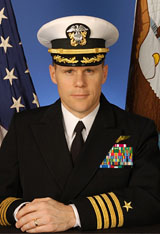United States and international militaries, while not considered first responders for most humanitarian assistance efforts, are called upon to assist the humanitarian sector in responding to major sudden onset disasters when there is an acknowledged gap between the disaster needs that the relief community is being asked to satisfy and the resources available to meet them. While coordination between humanitarian and military actors has improved over the past decade, there is still a need for more effective coordination and collaboration to provide more efficacious responses. This panel will explore strategies, concepts, education/training programs, or organizational changes that militaries should consider to improve the civilian-military humanitarian responses.

Moderator: DAVID POLATTY, Professor
U.S. Naval War College
Professor Dave Polatty has served as a civilian faculty at the U.S. Naval War College (NWC) since 2008 and teaches a number of courses on strategic and operational planning. He specializes in military planning, humanitarian assistance/disaster relief, command and control, and maritime security. Professor Polatty is co-founder and co-director of the NWC College of Operational & Strategic Leadership – Harvard School of Public Health “Joint Civilian-Military Humanitarian Working Group,” which was established in May 2014 to explore academic and research collaboration areas that can improve coordination, synchronization, and integration of humanitarian responses during disaster.
[expand title=”Read Full Bio” swaptitle=”Hide Full Bio”]Professor Dave Polatty has served as a civilian faculty at the U.S. Naval War College (NWC) since 2008 and teaches a number of courses on strategic and operational planning. He specializes in military planning, humanitarian assistance/disaster relief, command and control, and maritime security. Professor Polatty is co-founder and co-director of the NWC College of Operational & Strategic Leadership – Harvard School of Public Health “Joint Civilian-Military Humanitarian Working Group,” which was established in May 2014 to explore academic and research collaboration areas that can improve coordination, synchronization, and integration of humanitarian responses during disaster.
Professor Polatty is a fourth generation Naval Officer and in addition to his civilian faculty position, continues to serve as a Commander in the U.S. Navy Reserve. He has commanded reserve units supporting U.S. Forces Korea, U.S. Naval Forces Southern Command/U.S. Fourth Fleet, U.S. Strategic Command Center for Combating WMD, and is currently commanding officer of Navy Reserve U.S. European Command J3. While on active duty from 1992 to 2003, he served as both a Surface Warfare Officer on board USS TARAWA (LHA-1) and Naval Flight Officer in the P-3 Orion community.
He graduated from the U.S. Naval Academy in 1992, earning a BS in History. He graduated with highest distinction from the U.S. Naval War College in 2006, earning a MA in National Security Strategic Studies and receiving the Navy League William S. Sims Award. He is also a graduate of U.S. Joint Forces Staff College.
[/expand]

CAPTAIN ROBERT T. CLARK, Commanding Officer
U.S. Navy – Navy Reserve, Chief of Naval Operations, Operations and Plans (N3/N5)
Captain Clark has served in the Navy since 1990. A Naval Flight Officer, his experience includes patrol aviation, aircraft carrier operations, operational planning, and information operations. He has served in every geographic combatant command region. In 2010, he helped stand up then led as a Battle Staff Captain the SOUTHCOM Crisis Action Center for Operation UNIFIED RESPONSE Foreign Humanitarian Assistance/Disaster Relief in Haiti. In his civilian career, he is employed by General Dynamics in the Navy shipbuilding industry. Captain Clark is a graduate of the University of Rhode Island where he earned undergraduate and graduate degrees in Business Administration. He later graduated from the U.S. Naval War College and the U.S. Joint Forces Staff College. In 2004, he was selected as the Association of Naval Aviation Reserve Naval Flight Officer of the Year. He is a member of the Navy Strategic Discussion Group.
[expand title=”Read Full Bio” swaptitle=”Hide Full Bio”]Captain Clark has served in the Navy since 1990. A Naval Flight Officer, his experience includes patrol aviation, aircraft carrier operations, operational planning, and information operations. He has served in every geographic combatant command region. In 2010, he helped stand up then led as a Battle Staff Captain the SOUTHCOM Crisis Action Center for Operation UNIFIED RESPONSE Foreign Humanitarian Assistance/Disaster Relief in Haiti. In his civilian career, he is employed by General Dynamics in the Navy shipbuilding industry.
Captain Clark is the son of a WWII Navy Veteran and the grandson of a WWI Army Veteran. On active duty he was a P-3 Orion Mission Commander, Flag Lieutenant in Italy, and Assistant Navigator aboard the aircraft carrier USS CARL VINSON. A member of the Navy Reserve since 1999, he has served as Executive Officer of an aviation squadron as well as commanded reserve component units supporting U.S. FORCES KOREA, U.S. SOUTHERN COMMAND, U.S. CYBER COMMAND and the Chief of Naval Operations. Captain Clark is currently the Commanding Officer of Navy Reserve CNO Operations and Plans (OPNAV N3/N5). He is also serving as the Chief of Staff for the Secretary of the Navy’s National Navy Reserve Policy Board.
Captain Clark is a graduate of the University of Rhode Island where he earned undergraduate and graduate degrees in Business Administration. He later graduated from the U.S. Naval War College and the U.S. Joint Forces Staff College. In 2004, he was selected as the Association of Naval Aviation Reserve Naval Flight Officer of the Year. He is a member of the Navy Strategic Discussion Group.
[/expand]

MICHAEL MARX, Senior Civil-Military Coordination Advisor
United Nations Office for the Coordination of Humanitarian Affairs (UN/OCHA)
Michael Marx is currently the Senior Civil-Military Coordination Advisor for the United Nations’ Office for the Coordination of Humanitarian Affairs (UN/OCHA) at the UN Headquarters in New York. Prior to this position, he was based in Geneva, Switzerland where he served as the Chief of the Civil-Military Coordination Section (CMCS) in UN/OCHA in Geneva. Michael joined the UN after more than two decades working within the US Government, including serving as the Division Director for the Disaster Response and Mitigation Division in the Office of US Foreign Disaster Assistance at the US Agency for International Development (USAID/OFDA).
[expand title=”Read Full Bio” swaptitle=”Hide Full Bio”]Michael Marx is currently the Senior Civil-Military Coordination Advisor for the United Nations’ Office for the Coordination of Humanitarian Affairs (UN/OCHA) at the UN Headquarters in New York. Prior to this position, he was based in Geneva, Switzerland where he served as the Chief of the Civil-Military Coordination Section (CMCS) in UN/OCHA in Geneva. OCHA’s Civil-Military Coordination Section is mandated to facilitate and coordinate the access to and use of international Military and Civil Defence Assets (MCDA) in countries hit by humanitarian emergencies. For this purpose, it serves as the UN focal point for governments, international organizations and military and civil defence establishments for the employment of these assets in humanitarian situations.
Michael joined the UN after more than two decades working within the US Government, including serving as the Division Director for the Disaster Response and Mitigation Division in the Office of US Foreign Disaster Assistance at the US Agency for International Development (USAID/OFDA). While in OFDA he served in various disaster response assignments, including Disaster Response Team Leader; Africa Team Leader; DART Team Leader (Disaster Assistance and Response Team) in Iraq, Afghanistan, Ethiopia, and Mozambique; as well as the Response Manager for the US Government’s assistance to numerous crises, including the Asia Tsunami in 2004 and the Pakistan Earthquake in 2005.
Mr. Marx is also a former US Army Officer, whose tours included Asia, Europe, and Africa. While in the Army, he participated in several support operations to international disaster responses, including operations in Asia, Africa, and Latin America and the Caribbean.
[/expand]

MICHAEL LAPPI, Director of Field Operations
Harvard Humanitarian Initiative
Dr. Michael Lappi is the Director of Field Operations and the program lead for Civilian-Military Affairs at the Harvard Humanitarian Initiative in Cambridge, MA. Dr. Lappi has extensive national and international experience in the fields of humanitarian assistance and disaster response having served in Africa, the Caribbean, Latin America, the Middle East, Southeast Asia, and the United States. As a Naval Medical Officer, Dr. Lappi has served in several senior leadership positions during his over 16 years of active and reserve duty, including tours as the Joint Special Operations Task Force Surgeon, Afghanistan, and the Naval Special Warfare Task Unit Surgeon, Horn of Africa. He is Board Certified in Occupational and Environmental Medicine, a Fellow of the American College of Occupational and Environmental Medicine, and holds appointments at the Harvard Medical School, Harvard School of Public Health, Boston Children’s Hospital, and Cambridge Health Alliance.
[expand title=”Read Full Bio” swaptitle=”Hide Full Bio”]Dr. Michael Lappi is the Director of Field Operations and the program lead for Civilian-Military Affairs at the Harvard Humanitarian Initiative in Cambridge, MA. Dr. Lappi has extensive national and international experience in the fields of humanitarian assistance and disaster response having served in Africa, the Caribbean, Latin America, the Middle East, Southeast Asia, and the United States. Most notably, he provided critical leadership to the American Red Cross during Hurricane Katrina and Rita relief efforts, as well as to Partners In Health, the Clinton Health Access Initiative, and the US Department of Defense following the earthquake in Haiti.
As a Naval Medical Officer, Dr. Lappi has served in several senior leadership positions during his over 16 years of active and reserve duty, including tours as the Joint Special Operations Task Force Surgeon, Afghanistan, and the Naval Special Warfare Task Unit Surgeon, Horn of Africa. He currently serves as the Reserve Specialty Leader for Undersea Medicine, and was recently selected for promotion to the rank of Captain in the United States Navy.
Dr. Lappi has degrees from the University of Miami (BS), The Ohio State University (MS, PhD), Ohio University (DO), and the Harvard School of Public Health (MPH), as well as a diploma from the United States Naval War College (Command and Staff Program). He is Board Certified in Occupational and Environmental Medicine, a Fellow of the American College of Occupational and Environmental Medicine, and holds appointments at the Harvard Medical School, Harvard School of Public Health, Boston Children’s Hospital, and Cambridge Health Alliance.
[/expand]

BRITTANY CARD, Program Coordinator
Harvard Humanitarian Initiative
Brittany Card is the Program Coordinator for the Signal Program on Human Security and Technology at the Harvard Humanitarian Initiative (HHI). She previously worked as a consultant for the United Nations Office for the Coordination of Humanitarian Affairs and as a research assistant for the Qatar Computing Research Institute. She is a co-recipient of the 2012 United States Geospatial Intelligence Foundation’s Industry Intelligence Achievement Award for the work of the Satellite Sentinel Project and a co-winner of the 2013 Humanity United/USAID Mass Atrocity Prevention Tech Challenge.
[expand title=”Read Full Bio” swaptitle=”Hide Full Bio”]Brittany Card is the Program Coordinator for the Signal Program on Human Security and Technology at the Harvard Humanitarian Initiative (HHI). She previously worked as a consultant for the United Nations Office for the Coordination of Humanitarian Affairs and as a research assistant for the Qatar Computing Research Institute. Ms. Card joined HHI to work as the Data Analysis Coordinator for the Satellite Sentinel Project (SSP) in 2011.
She is a co-recipient of the 2012 United States Geospatial Intelligence Foundation’s Industry Intelligence Achievement Award for the work of the SSP and a co-winner of the 2013 Humanity United/USAID Mass Atrocity Prevention Tech Challenge. Prior to joining HHI, Ms. Card worked as the communications intern at the Harvard Kennedy School’s Belfer Center for Science and International Affairs.
She earned an Honors BA in International Relations and a minor in Spanish Language from Saint Anselm College in 2010.
[/expand]